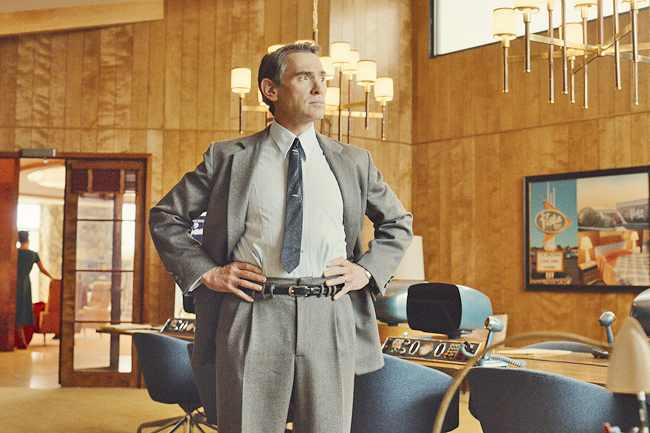NEW YORK (AP) – Blink and you might miss it, but a man wearing a business suit and a jetpack casually blasts off in the first episode of the new series Hello Tomorrow!
He waves to his wife outside his suburban home and soars into the sky. Below him is a fascinating mix of ‘50s-era cars with tail fins that hover over the ground and robots that do everything from walk the dog to deliver mail.
If seems like the utopia we always dreamed about until we see a driverless truck accidentally smash into a homeowner. Not all is perfect in this futuristic world – and the creators want it that way, studded with misery and human quirks.
“Utopias terrify us,” said Lucas Jansen, who co-created the show with Amit Bhalla. “The ‘bots can do a lot for you, but they can’t relieve you of your human burden. And we’re ever so grateful and would hope that that continues to be the case as our society progresses.”
The Apple TV+ series taps into the alternate-reality, retro-cool of the ‘50s that’s so popular right now – see the film Don’t Worry Darling and the streaming series For All Mankind – as it explores the American dream.

At its heart is Jack, a travelling salesman played by Billy Crudup who sells condos on the moon – sorry, “lunar residencies” – to those disappointed with life on Earth. “We’re not just selling. We’re changing lives,” he told his selling team.
It’s a scam, of course, one that only he knows is happening and it requires him and his hoodwinked team to occasionally hit the road before suckers wise up and want their money back.
The series explores the American fantasy that there’s something on the horizon – a medicine, a new product, a lottery win – that will make our lives full. “We imagine that has a lot to do with the American experience right now,” said Bhalla.
While some viewers may see Crudup’s character as a con man like Bernie Madoff or a character straight out of The Music Man, the actor himself sees him more like a preacher, painting a better future for his flock.
“In Jack’s mind, providing that hope is proselytising. That is the good word,” he said. “The good word is the future because the present is so mundane, it’s so boring. It doesn’t have any of the American promise. It just has the reality of living.”
Bhalla and Jansen dreamed up a carefully curated world for this morality tale, one that can be called “retro-future” or an “an atomic age vision of the future”. It pulls from a familiar collective consciousness – old-school diners, fedoras, leafy suburbs, apple-cheeked boys and girls – and adds tonnes of cheery robots. Enough is the same – like that customer service is still terrible – and enough is different – baseball involves something called “home zone” – to keep you off-balance.
The music team was tapped to find songs that were nostalgic but yet unfamiliar. So they used deep cuts of Louis Prima or The Dreamliners instead of their hits. Composer Mark Mothersbaugh, formerly of the band Devo, dug out his collection of vintage synthesisers and instruments to re-create period sounds.
It took some time for all parts of the creative team to find the right gear. At first, the designers proposed sleek, scary robots, but Bhalla and Jansen told them they wanted something more warm and rusted.
“We wanted the technology to feel lived in. To feel like our phones do – scratched and cracked and whatever. They’re not what comes out of the advertisement,” said Bhalla.
Bhalla and Jansen cut their teeth in TV under David Milch, the visionary creator of such shows as Hill Street Blues, NYPD Blue and Deadwood. They met while writing for Milch’s show Luck and teamed up again for Bloodline.
The new series was inspired in part by the training videos made for car salesmen in the ‘50s that Bhalla and Jansen – together with producer Ryan Kalil – became fascinated by. “They were like these holy texts of capitalism,” said Jansen.
They soon became interested in the idea of a salesman who begins to believe his own pitch.
“This could be a very powerful, very engaging and charismatic salesman who also lived sort of poised over a chasm of crazy, disastrous possibilities,” said Jansen.
Life for Crudup’s salesman gets more complicated when he is forced to confront the reality of his duplicity and the wreckage he’s made of his life. Years of travelling has left him alone and estranged from his family.
“What you see is this guy being ripped apart,” said Crudup. “It’s a great contrast for somebody who has to live with the things that they’ve done while still trying to maintain the optimism that is at their core.”


